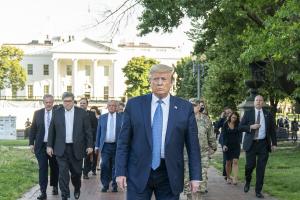 Let’s begin by defining our terms. If one claims to be a Christian, as I understand it, that means that one claims to be a follower of the Christ, a follower of the anointed one that Christians say is Jesus of Nazareth. “Christos” is a Greek translation of the Hebrew word “Messiah” (meshiach), a word meaning “anointed” or “sent”. Other persons have claimed to be Messiah over the centuries, but for Christians the Messiah is Jesus. And because that is so, a follower of Jesus Messiah listens carefully to what that Messiah has said in the Bible and attempts to emulate those words and actions. As Jesus forgave sinners, calling all to love their enemies, and ate with marginalized people, so Christians are called to do the same. As Jesus called into question the ultimate power of the Roman state, saying that a Roman coin faced with the visage of the emperor might be used to pay Roman taxes, but ultimate duty belongs to the God of all peoples, he implied clearly that Roman power, like all limited state power, is forever subject to the power of God. Christians devote themselves to this Jesus and strive to become in however limited ways, like him in word and action.
Let’s begin by defining our terms. If one claims to be a Christian, as I understand it, that means that one claims to be a follower of the Christ, a follower of the anointed one that Christians say is Jesus of Nazareth. “Christos” is a Greek translation of the Hebrew word “Messiah” (meshiach), a word meaning “anointed” or “sent”. Other persons have claimed to be Messiah over the centuries, but for Christians the Messiah is Jesus. And because that is so, a follower of Jesus Messiah listens carefully to what that Messiah has said in the Bible and attempts to emulate those words and actions. As Jesus forgave sinners, calling all to love their enemies, and ate with marginalized people, so Christians are called to do the same. As Jesus called into question the ultimate power of the Roman state, saying that a Roman coin faced with the visage of the emperor might be used to pay Roman taxes, but ultimate duty belongs to the God of all peoples, he implied clearly that Roman power, like all limited state power, is forever subject to the power of God. Christians devote themselves to this Jesus and strive to become in however limited ways, like him in word and action.
Nationalism means: identification with one’s own nation and support for its interests, especially to the exclusion or detriment of the interests of other nations. If one claims to be a nationalist, one’s devotion is to the nation in which one lives, or perhaps devotion to a particular nation even if one happens not to live there. And the nationalist by definition has a lesser interest, or no interest at all, in any other nation state, imagining that the chosen nation is superior in all ways to any other nation. Hence, concern for any other nation is minimized, if not excluded. The current president of the US, Donald Trump, has again and again announced his quite militant nationalism by speaking in ways that imply that the USA is far better than all other nations—stronger, with better health care, better education, better sports teams, etc.—and by withdrawing US involvement in any number of international treaties—with China, Iran, the European Union, Russia, and most recently with the World Health Organization of the United Nations, suggesting that they failed in the recent pandemic crisis, although exactly how they failed remains unclear in the president’s frequent castigation of the organization. Of course, Donald Trump’s actions during the pandemic he judges “perfect,” “nothing less than a 10,” and the US leads the world in fighting COVID-19 in all the ways that count. Of course, it is true that the US does indeed lead the world in the number of deaths from the virus, well over 108,000 at most recent count, but the president continues to say that without his perfect leadership it would have been far, far worse.
This is the way nationalists talk; everything in the US is “great,” while other nations fail in ways too numerous to mention. An oxymoron is a figure of speech where apparently contradictory terms appear in conjunction with one another. The term is Greek, literally meaning “sharply or pointedly foolish.” An example might be to suggest that an action represents “cruel kindness” or perhaps more famously one often speaks of a “living death.” When placing the adjective “living” to define “death,” one is saying something that on the surface is ridiculous; if one is dead, they cannot be living. But the oxymoronic phrase suggests that a certain sort of living may in fact be little better than death. In the former example, “kindness,” generally a lovely and generous emotion or action, may become on occasion “cruel,” if the act leads to something less than lovely or generous. Oxymorons pit opposites together, leading to a different mode of thinking, a fresh angle on an idea thought to be well understood. Oxymorons reveal a rhetorical point or open up a paradox. I say that Christian Nationalism is thus an oxymoron, and as such it reveals a paradox and in this case a very dangerous one. When Donald Trump last Monday, June 1, gave a speech in the Rose Garden at the White House, announcing that if the governors of certain states did not crack down on or “dominate,” using his term, on the rioting and looting that was occurring among a small minority of those protesting the murder of George Floyd in Minneapolis under the knee of a police officer, he vowed to summon the US military to take control from those governors whom he called “weak”. Then, after that scripted speech, he, at the behest of his Attorney General, Bill Barr, demanded that the streets around the White House be cleared of all protestors—who at the time were only peaceful in their protests as television coverage made quite clear–, using flash grenades and tear gas to do so, in order that the president and a small group of his aids and cabinet, might stroll in leisurely fashion, across the street to the historic St. Johns Episcopal Church for a photo op. This church had been attended by presidents back to James Madison and thus has a high visibility in presidential history.
In front of the church marquee, Mr. Trump held up a Bible high in the air with his right hand, and had the photographer take several snaps. Exactly what he thought this now widely circulated photo was supposed to suggest remains a bit unclear. However, for those attuned to the rites of Christian Nationalism, it was all too clear. What the president had just demanded in the Rose Garden, namely the forceful control of the streets of America by any means necessary, he now announced in the photo was to be authorized and demanded in the Bible, the sacred book both of Christians and Jews. This is a parade example of Christian Nationalism, that oxymoronic construct that has blighted the true message of Christianity for centuries, perhaps since the Roman Empire became Christian under the rule of Constantine in the 4th century CE.
Perhaps the unintended irony of the photo was that peaking behind the president’s left shoulder, almost but not quite obscured by the figure of the president, was the clear announcement by the church that “all are welcome.” Most churches, of course, make this same proclamation on their marquees, though some have a very hard time living up fully to the phrase. However, in the case of the Episcopal Church in Washington DC, it means exactly what it says; all really are welcome, no matter the gender, no matter the race, no matter the sexual orientation, no matter the nationality, at that church there are no barriers at all to participation and membership. I belong to a United Methodist Church, Westwood in Los Angeles, that says the same and acts fully on what we say, unlike, I am sad to say, the national United Methodist Church of which we remain part. What all this means, of course, is that Christian Nationalism is finally not Christian at all.
In Nazi Germany there was a so-called “National Church,” claiming full compatibility with the Nazi Party; one could be a church and party member at the same time. Karl Barth in his famous Barmen Declaration of 1933 stated pointedly that such thing was impossible; there could not be any organization calling itself church that could embrace Nazism as an acceptable movement of human beings. For his clarion call, Barth was banished from Germany and lived the rest of his life in Switzerland at the University of Basel. Dietrich Bonhoeffer left a safe and prosperous American life to return to Germany during World War II, joined the active resistance against the rule of Hitler, and died shortly before war’s end, a martyr in his attempt to assassinate the Nazi dictator. As both Barth and Bonhoeffer demonstrated, there can be no Christian Nationalism.
The words and actions of Donald Trump have aligned him with the notion of a kind of Christian Nationalism, though I doubt his Christianity is mature enough to indicate any real grounding in that raised Bible that would allow him to call himself by that oxymoronic phrase. Still, his actions recently have been high-pitched dog whistles to those among his followers who seek to make America first in their devotion to the exclusion of other “inferior” peoples. With raised scripture, Mr. Trump utters silently a clarion call to all who imagine that America is best and first in all things, and that other nations simply do not and cannot measure up. But, nevertheless, for those of us who claim Christianity as the center of our religious lives, there is no such thing as a Christian Nationalism, despite the dour Bible lifter, poised in glowering mode, while thousands of the people he has sworn to lead protest against racism and oppression, and long for a word of unifying language from the supposed president of the entire country. Alas, from the proclaimed Christian Nationalist Mr. Trump, we will never hear such language, because such persons do not seek to unify, but only to divide and abuse. This is what he has tried to do now for 3 1⁄2 years. May November, 2020 bring an end to such debased and dangerous actions and words, and may the next president be what we hope: one who may lead and unify and work to repair the cracks and fissures created by this Christian Nationalist who currently stands, Bible raised, demanding that all show fealty to him and to the nation he purports to lead. Christians, beware! To follow that one is to run away from the genuine call of the Christian Messiah. One may certainly love one’s country, but that love is first reserved for God and the Messiah of God. Any nation may only be great if it embodies the demands of the Christian Gospel for justice, equity for all citizens, equal access to all the rights and privileges made possible by that state. America is not a Christian Nation—its own Constitution’s First Amendment makes that certain– but it will always be judged by its adherence to that brilliant Constitution that enshrines the very sharp demands of the best of the biblical tradition.
(Images from Wikimedia Commons)










